Sony VAIO Pro 13: Exceptionally Portable
by Jarred Walton on October 16, 2013 12:00 AM ESTSony VAIO Pro 13: Excellent Battery Life
If the performance in applications wasn't particularly impressive, where Sony positively shines is in their battery life. We have our standard Light, Medium, and Heavy battery life tests, and even the Light test is reasonably demanding (loading four web pages every 60 seconds). We also run the LCD at 200 nits (87% on the VAIO Pro 13), so turning down the brightness will only improve these results.
This is also one of the tests where we can make cross-OS comparisons to Apple's MacBook Air 13. We've seen in the past that OS X gets substantially better battery life with MacBooks than Windows, but we're at least able to run the same workloads so the tests are more or less “fair”. Anand ran the MBA13 under both Windows 8 and OS X, and we've included both results in the charts below. For the VAIO Pro 13, we likewise have results using just the integrated 37Wh battery as well as with the extra sheet battery.
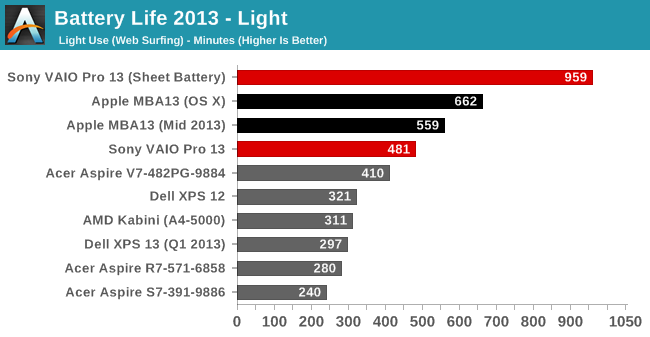
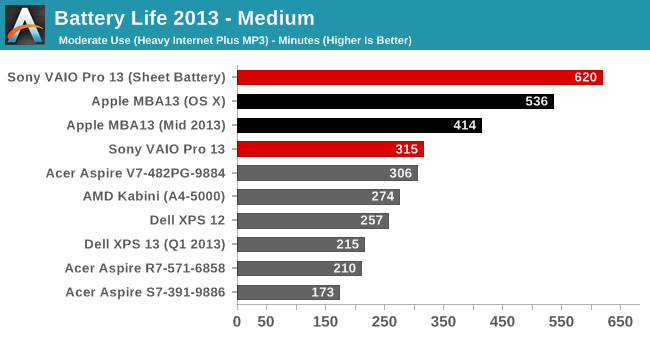
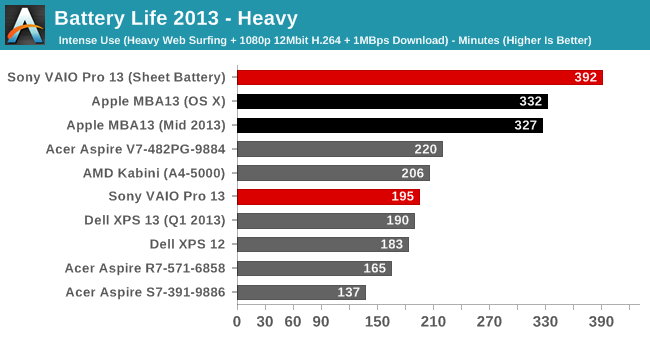
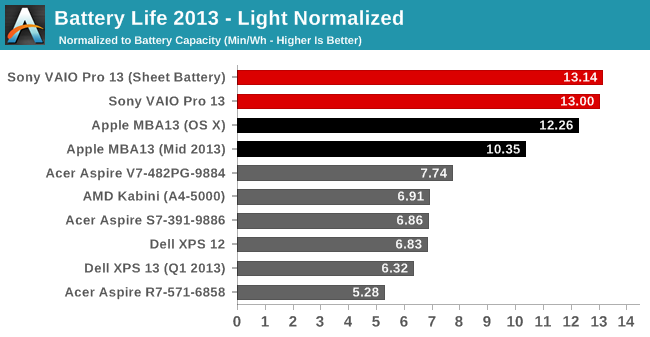
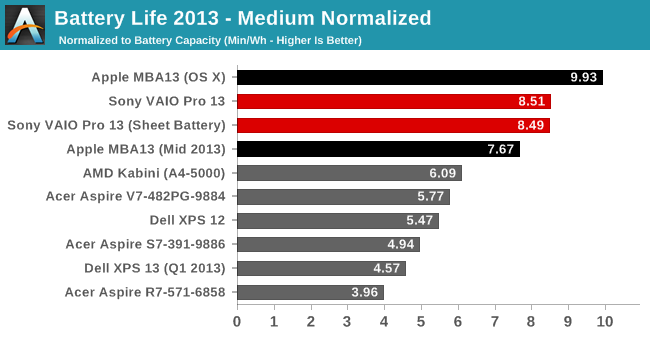
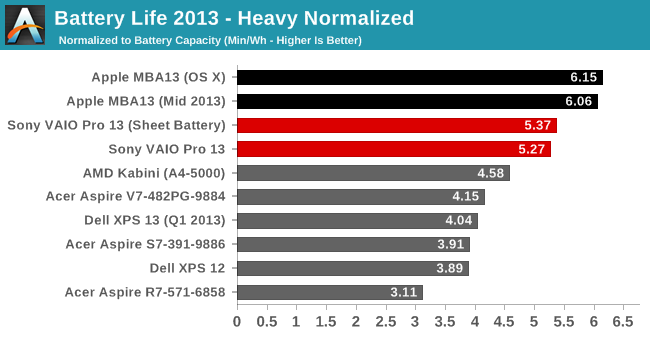
In terms of pure battery life numbers, with the extra battery the Sony VAIO Pro 13 comes in at the top of our charts, but even without the doubling of capacity it does well. In raw battery life, it trails the Haswell-equipped MacBook Air 13 (particularly when the latter is running OS X), and in the Heavy test it also falls behind the Acer V7 and the AMD Kabini prototype. That's only part of the story, however, as the integrated battery is pretty small compared to many of the other laptops in our charts.
Look at the normalized battery life and the VAIO Pro 13 is quite a ways ahead of any other (Windows) contender in the Light and Medium loads. Apple still does better in heavy loads, indicating that Apple is either more aggressive in getting down to lower power C-states, and in OS X Apple also posts an impressive result in our Medium workload. The Heavy load tends to not allow the CPU to relax much (It averages out to around a 20-30% CPU load throughout the test), so it's not too surprising that the MBA13 results are a lot closer to their Win8 results in that particular test.
Adding the sheet battery basically doubles battery life, which puts Sony way ahead of any other laptop we've tested in recent years (though it doesn't change the normalized results). It was almost painful to test battery life, simply because it took so long for the battery to go dead. With the Light dual-battery testing, I started the test, went to bed, came back the next morning and the combined battery charge was still around 50%. If you need even more battery life, you could purchase additional external batteries and swap them quite easily with no downtime, and since Sony has the laptop drain the sheet battery first, you don't need to worry about the integrated battery unexpectedly running out of power.
However you want to look at it, the Sony VAIO Pro 13 delivers on the battery life front. This is how every Haswell laptop should behave, at a minimum. Sadly, we have plenty of examples where this level of power optimization is clearly not in effect, but I'll save that discussion for an upcoming review (cough, Clevo, cough).










106 Comments
View All Comments
JarredWalton - Wednesday, October 16, 2013 - link
I don't know about the Tri-luminos tech confusing my colorimeter, but I have verified on a couple laptops that the calibration just looks really off, so I've held off doing any more potentially flawed testing.As for build quality, I noted that it's by design, but I disagree with the design. Yes, it should hold up reasonably well, but laptops like the ASUS U-series, MacBook Air, heck even the Acer S7 all feel better (though the keyboard on the Acer is not at all good in my book). It's a sacrifice of rigidity in favor of being ultra lightweight, and that's fine -- I can live with it and not complain too much. Still, I wish Sony would reinforce the chassis just a bit more. Carbon fiber is not at all heavy, so another layer or two bonded on there would do wonders.
SSD performance is good, and really maximum transfer rates start to become meaningless past a certain point. I would rather have a somewhat slower 256GB SSD than a faster 128GB SSD, simply because I need more capacity. But the VAIO Pro 13 does boot and load programs very fast (other than Windows 8 Apps, which as usual take far too long to load).
teiglin - Wednesday, October 16, 2013 - link
My 256GB unit has a Samsung, and I got 1GB/s sequential read and 825MB/s sequential write just now, if you're curious. Is the Toshiba worse?As for the build quality, I didn't think Jarred was too harsh on it--he mentioned that he liked a more "solid" feel as a matter of preference and not that there's anything inherently wrong with the flexible chassis. I can get a noticeable amount of flex even when mine is closed though, if I squeeze it--again not problematic necessarily, but I can understand if people would like a more rigid design better. Obviously increasing rigidity isn't going to keep the laptop at 2.3lbs.
juhatus - Wednesday, October 16, 2013 - link
When I was ordering, I picked the free 256gb option. I just checked the sony webstore again and now they are offering msata and pci-e options for SSD atleast in Europe. (256gb pci-e upgrade is free btw).I remember the Toshiba being very similar to 840pro speeds, maybe its the msata version. But anyhow its plenty fast. SSD is just something that people should make note because there are alot of different versions Sony ship with these.
SetiroN - Wednesday, October 16, 2013 - link
You really need to re-think your benchmark suite.Who gives a crap about how far an ultraportable goes below 20fps in games.
We need to know how its SSD performs, how long it takes to elaborate files, zip them, copy them. How fast network transfers are. REAL WORLD USE, not freakin' cinebench.
JarredWalton - Wednesday, October 16, 2013 - link
The PCMark scores more or less encapsulate all of the data points you're after. I noted that the SSD is quite fast, and has very good boot times. The CPU results are there just as reference points, and the gaming tests are there to show that, no, this is not a gaming laptop. You'll notice how much time I spent discussing the benchmarks, and that's because for the most part the benchmarks (outside of battery life) simply aren't important. It's more than fast enough. If you have to know how much faster it is than other laptops, you're probably going to want something with a quad-core CPU and a dGPU. Ultrabooks for the most part target the mainstream user that values mobility over performance, so that's the focus of the review.piroroadkill - Wednesday, October 16, 2013 - link
ASUS UX301: with the desired i7-4558U (which is also what I'm interested in) is available in Germany.http://www.amazon.de/Zenbook-UX301LA-Ultrabook-Int...
Since it's publicly available, there's no NDA. I say buy one from Germany and get it shipped. You know people want an indepth review on it.
piroroadkill - Wednesday, October 16, 2013 - link
Also, I mean the i7-4558U is what I'm interested in. The Asus Zenbook Infinity (UX301) does look good, too. I'd love to see it released properly so I could play with the available configurations.However, pretty much any laptop with this CPU that is 13" is worth reviewing.
JarredWalton - Wednesday, October 16, 2013 - link
Now if only I had the money to buy things and have them shipped to me for review....Fatality - Wednesday, October 16, 2013 - link
Great review, But where is the mention of bloatware? Does this thing come with lots of it? I ask this because specs and presence of Bloatware are the primary factors I base my buying decision on. I know a lot of people who do that as well. Has Bloatware? no buy.juhatus - Wednesday, October 16, 2013 - link
I think win8 has generally reduced bloat, but on this vaio pro 13 Sony has put few modern app's and mcafee virus protection (witch i instantly uninstalled and went with win8 defender) Also i think there was the office365 trial included, have not even started that. But id say very little bloat.